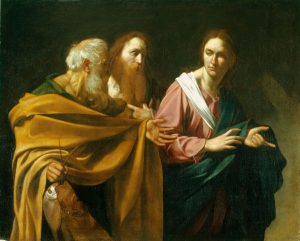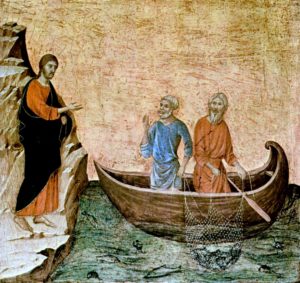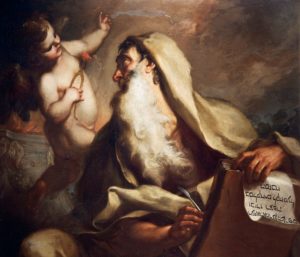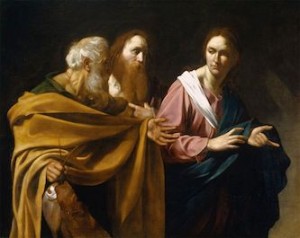Illuminations on the Lectionary readings for Jan. 15, 2023 (Epiphany 2A)
First Reading: Isaiah 9:1-4
Swirling snow and bitter chill remind us that this is January, the depth of winter for us. Yet Epiphany draws us to the light of hope that calls us to join Jesus in “proclaiming the good news of the kingdom.”

The Calling of Saints Peter and Andrew ( 1602-1604), oil painting on canvas by Michelangelo Merisi da Caravaggio (1573-1610). Queen’s Gallery, Buckingham Palace, London. (Click image to enlarge)
Gracious light shines through Sunday’s Lectionary readings. In the first reading, the Prophet Isaiah speaks of hard times as Israel’s northern lands of Zebulon and Naphtali have fallen to the powerful Assyrians. The nation’s fate is in doubt, but the prophet foretells that God’s light will banish the darkness. In words familiar from Handel’s Messiah, he foretells a world of bounty and joy as the people who walked in darkness will have seen a great light.
Psalm: Psalm 27:1, 5-13
God indeed is our light, the Psalmist exults. God is our stronghold and our salvation, so there is nothing to fear. This is not just a happy-clappy song, though. The verses remind us that bad things can happen even in the lives of God’s people. The people face adversaries. They are threatened by armies of enemies. Sometimes it even feels as if their own parents have turned against them. But we pray with them that God will hear us, love us, protect us and keep us safe.
Second Reading: 1 Corinthians 1:10-18
Last week in the opening lines of Paul’s first letter to the people of Corinth in Greece, we heard Paul greeting this beloved community fondly. With that out of the way, he now gets to right to the point: He has heard that this small church is falling into disunity. Its members are quarreling over both doctrinal issues and leadership. Paul counsels them to remember that baptism brings the community together in unity in Christ. The very ideas of God resurrecting a crucified criminal and offering salvation to all through Christ might sound like foolishness to those who haven’t found Christ, he says. But this is what saves us through the power of God.
Gospel: Matthew 4:12-23
The public ministry of Jesus begins. Grieving the murder of his cousin John, Jesus steps up. He leaves his home in Nazareth to go to Capernaum, a larger city on the shore in Galilee (the ancient region of Zebulon and Naphtali that Isaiah invoked in the first reading). Jesus is starting to gather crowds and preach as John had done; he repeats John’s words, “Repent, for the kingdom of heaven has come near.” Matthew, who often reaches back to the Old Testament to find texts that can be interpreted to show Jesus fulfilling Messianic prophecy, lifts up the Isaiah passage that we hear in Sunday’s first reading. Then Jesus calls four fishermen to follow him. They eagerly drop their nets and follow as he preaches, teaches, cures and heals, leaving old Zebedee behind to mend his departed sons’ nets and tend the abandoned boat.



